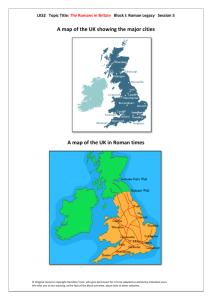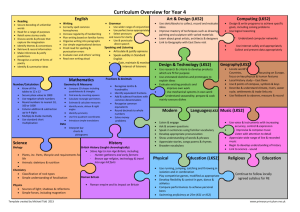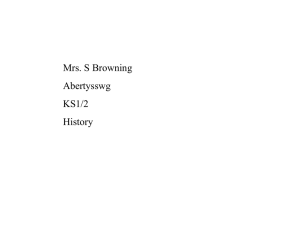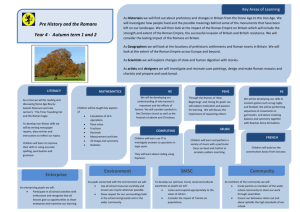Session 02 Text Resource
advertisement
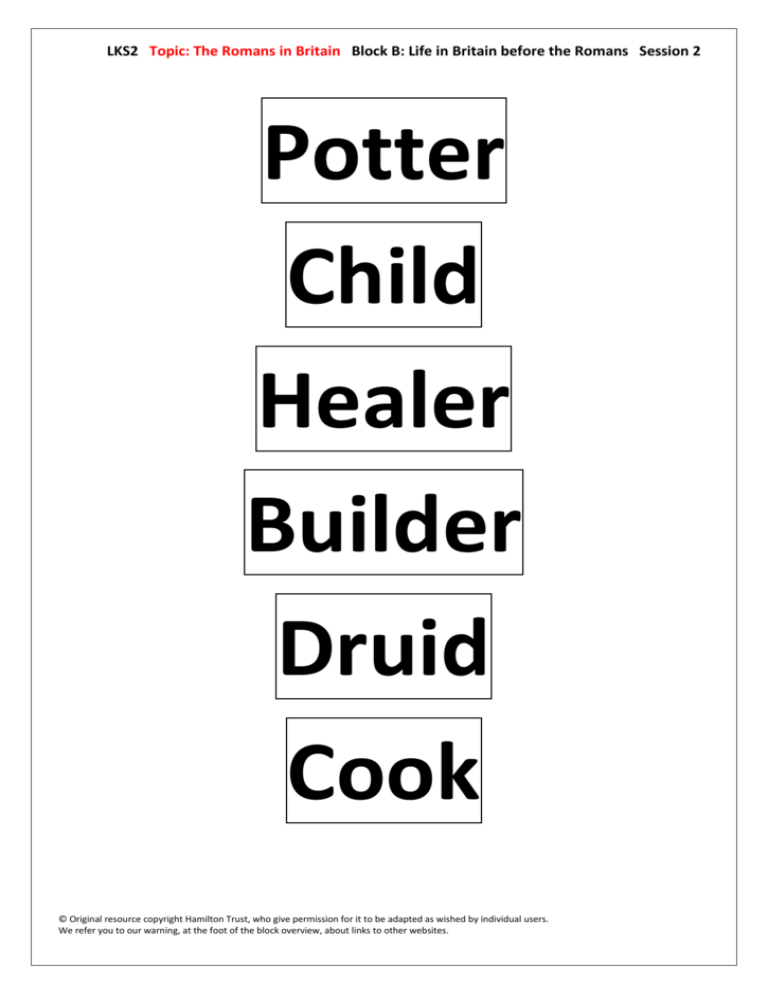
LKS2 Topic: The Romans in Britain Block B: Life in Britain before the Romans Session 2 Potter Child Healer Builder Druid Cook © Original resource copyright Hamilton Trust, who give permission for it to be adapted as wished by individual users. We refer you to our warning, at the foot of the block overview, about links to other websites. LKS2 Topic: The Romans in Britain Block B: Life in Britain before the Romans Session 2 Basket Maker Blacksmith Farmer Weaver Hunter Spinner © Original resource copyright Hamilton Trust, who give permission for it to be adapted as wished by individual users. We refer you to our warning, at the foot of the block overview, about links to other websites. LKS2 Topic: The Romans in Britain Block B: Life in Britain before the Romans Session 2 Potter You are the potter in your settlement. You are skilled at making different pots on your wheel. Your clay has to be dug out from the ground at a nearby clay pit. You shape the clay into pots using your spinning potter’s wheel. This wheel is made of wood and connected to a larger lower wheel that you spin with your foot. Once a pot is finished, you decorate it with lines and notches that you draw into the wet clay. Now you must fire the pot to make it hard and waterproof. This means heating it up to a very high temperature. You have to build a very hot fire in a special oven called a kiln. Once your pots are fired, they are ready to use. Everyone needs pots; mugs to drink from, bowls, plates and jugs for water. You can trade your pots for other things you need like cloth from the weaver or a knife from the blacksmith. Child You are a child in the Iron Age settlement. You spend your time working to help the grown-ups get on with their jobs so there is very little time left to play. You are expected to fetch water from the stream many times a day. It is heavy to carry and lots of people need it, not just to drink but for cooking, for the animal troughs and for the crafts people. The builder needs water to mix with dung, earth and straw to plug the gaps in the willow walls of round houses and the potter needs it to shape pots. You must also collect firewood for the round house fires and for the blacksmith’s forge. Another job is foraging for food like wild berries, roots, leaves and seeds. Your families depend on your help to survive. © Original resource copyright Hamilton Trust, who give permission for it to be adapted as wished by individual users. We refer you to our warning, at the foot of the block overview, about links to other websites. LKS2 Topic: The Romans in Britain Block B: Life in Britain before the Romans Session 2 Healer You have a lot of knowledge about plants and herbs. You know how to make herbal medicines that will help people when they get ill. If a neighbour has a fever or a pain, they come to you for a cure. You know which leaves to crush into an ointment to help heal a wound and which berries to chew for indigestion. You grow some of the plants you need close to your round house. Others grow in the nearby forests and you must go out collecting them with your basket. You have learnt your skills from old wise healers in your village. There are no books to learn from because nobody can read or write. It takes many years to learn all that you know and you must spend time teaching young healers so the knowledge is not lost in the future. People trade food and clothes for your remedies. Spinner It is your job to turn the wool from the sheep into yarn (woollen thread). When the wool is clipped from the sheep it is called fleece. You must brush out the fleece to get out the tangles and pick out all the twigs and dirt that has got caught in it. You use special brushes to help. This is called carding the fleece. Next you spin the carded fleece into yarn using a drop spindle. This is a wooden weight on the bottom of a short rod. You spin the weight and gradually catch in the fibres of the fleece which twists it into thread. It takes a long time to spin a skein of yarn. Next you dye the yarn into bright colours using vegetables and other parts of plants. Onion skins make a lovely yellow and woad makes a very popular blue. You will trade your yarn with the weaver. © Original resource copyright Hamilton Trust, who give permission for it to be adapted as wished by individual users. We refer you to our warning, at the foot of the block overview, about links to other websites. LKS2 Topic: The Romans in Britain Block B: Life in Britain before the Romans Session 2 Weaver You use the coloured yarn (woollen thread) from the spinner and turn it into cloth. You do this on a large wooden loom. The loom is a frame which has lots of long weighted threads hanging down from a bar at the top. You weave another thread in and out between them, making one row at a time. Gradually the rows build up to form cloth. By skilfully using different colours of threads, you can create lovely chequered patterns. These squared patterns are popular on clothes and blankets in the tribe. People need cloth and will trade food, pots and tools for it. Farmer Almost everyone in the village has to help produce food especially at the busiest times of the year, because without enough food, the tribe will not survive. In the spring, you must dig animal dung into the soil and pull out the weeds to get the fields ready to sow the seeds. This is hard work with hand tools. Once you have sown the seeds you must keep them watered and weeded. At harvest time, you need everyone in the village to help. There will be grain for bread and fruits and vegetables to harvest as well. You must organise the harvest helpers and make sure that the food is carefully stored so that it keeps through the winter months. The animals need to be looked after too. There are chickens, sheep, pigs and goats which provide eggs, milk and meat. Everyone who helps has a share in the harvest. © Original resource copyright Hamilton Trust, who give permission for it to be adapted as wished by individual users. We refer you to our warning, at the foot of the block overview, about links to other websites. LKS2 Topic: The Romans in Britain Block B: Life in Britain before the Romans Session 2 Builder It is hard work building a round house. Each one will be home to 15 – 20 Britons. First you must cut wooden stakes by hand from the branches of trees and make a large circle by driving them into the ground with a mallet. Next you cut lots of bendy willow and weave it in and out of the stakes to make the walls (this is called wattle). Now you must mix up dung, straw and mud (daub) and press it into the gaps in the willow to make the walls solid. The walls of the round house are made of wattle and daub. Next you need to make a pointed roof with strong branches and tie many bundles of straw onto the roof in layers starting at the bottom. This is called thatching. The rain will run down the straw and off the roof so that the round house stays dry. Don’t forget to leave a hole at the top for the smoke to escape! Sometimes you will be asked to do repairs on older round houses. Hunter The forests around your settlement are full of wolves, bears, deer and wild pigs called boars. The rivers and lakes are full of fish. These are valuable for food. You are skilled at tracking, hunting and spearing. You use a sharp spear which you can throw a long way. The blade was made by the blacksmith and you keep it very sharp. The animals you hunt are valuable not just for their meat as every part of the body is used. The skins make warm clothes and rugs for winter and the bones are used for tools like handles, needles, buttons and combs. You can trade with other members of the tribe. © Original resource copyright Hamilton Trust, who give permission for it to be adapted as wished by individual users. We refer you to our warning, at the foot of the block overview, about links to other websites. LKS2 Topic: The Romans in Britain Block B: Life in Britain before the Romans Session 2 Cook You prepare the meals for all the people in your round house (that could be up to 20!). Some of the children help you. Flour needs to be ground on a flat stone and mixed with water to make bread. There are vegetables to clean and chop and herbs to gather. You are going to make some stew but first you need to make sure the fire is nice and hot. You will probably have to send the children out for more firewood. A huge iron pot hangs over the fire on a long iron chain. On some days there is plenty of meat in the pot but other times meat is scarce and everyone takes pot luck! Blacksmith You are an important person in the settlement and your forge is a busy place. You are skilled at heating iron and shaping it to make tools, weapons and horse shoes. You have to make a very hot fire called a furnace. A child works the bellows for you which blasts the wood or coals with air from underneath and makes them glow red hot. When the iron heats to a very high temperature, it glows red and becomes soft. You use tongs to lift it from the furnace and carefully bash it into the shape you want with a hammer. You shape it over a huge lump of shaped iron called an anvil. Everyone respects your skill. © Original resource copyright Hamilton Trust, who give permission for it to be adapted as wished by individual users. We refer you to our warning, at the foot of the block overview, about links to other websites. LKS2 Topic: The Romans in Britain Block B: Life in Britain before the Romans Session 2 Basket Maker You plant willow and harvest it to make baskets. You are very skilled at your craft, weaving the bendy stems into lovely baskets with handles. The healer needs a basket to gather herbs and berries from the forest. The fruits and vegetables are stored in baskets over the winter and even the children need baskets to collect the firewood. Lots of people want to trade with the basket maker. Druid You are the priest of the Celtic religion. You make sacrifices to the Celtic gods and goddesses to keep them happy. At special times of the year you celebrate important festivals like Beltain in May. On this night, you light bonfires, chant prayers and lead the people in making sacrifices. You know which are the sacred trees and pools where people must go to worship the gods and goddesses like Lugh and Brigantia. You are an important person in the tribe because people believe you keep the gods and goddesses happy. © Original resource copyright Hamilton Trust, who give permission for it to be adapted as wished by individual users. We refer you to our warning, at the foot of the block overview, about links to other websites.
